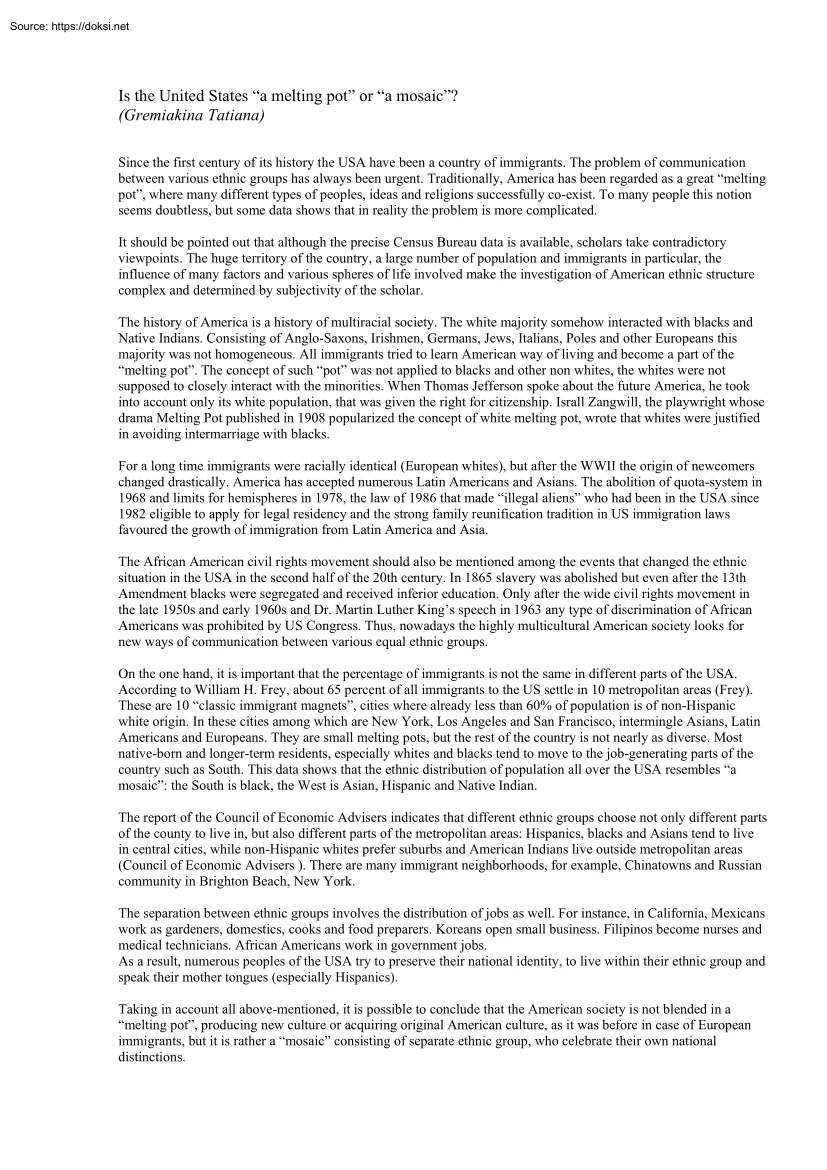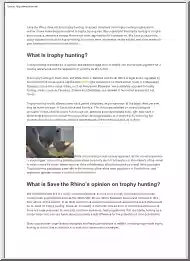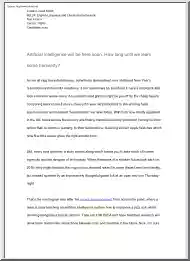A doksi online olvasásához kérlek jelentkezz be!

A doksi online olvasásához kérlek jelentkezz be!
Nincs még értékelés. Legyél Te az első!
Mit olvastak a többiek, ha ezzel végeztek?
Tartalmi kivonat
Is the United States “a melting pot” or “a mosaic”? (Gremiakina Tatiana) Since the first century of its history the USA have been a country of immigrants. The problem of communication between various ethnic groups has always been urgent. Traditionally, America has been regarded as a great “melting pot”, where many different types of peoples, ideas and religions successfully co-exist. To many people this notion seems doubtless, but some data shows that in reality the problem is more complicated. It should be pointed out that although the precise Census Bureau data is available, scholars take contradictory viewpoints. The huge territory of the country, a large number of population and immigrants in particular, the influence of many factors and various spheres of life involved make the investigation of American ethnic structure complex and determined by subjectivity of the scholar. The history of America is a history of multiracial society. The white majority somehow
interacted with blacks and Native Indians. Consisting of Anglo-Saxons, Irishmen, Germans, Jews, Italians, Poles and other Europeans this majority was not homogeneous. All immigrants tried to learn American way of living and become a part of the “melting pot”. The concept of such “pot” was not applied to blacks and other non whites, the whites were not supposed to closely interact with the minorities. When Thomas Jefferson spoke about the future America, he took into account only its white population, that was given the right for citizenship. Israll Zangwill, the playwright whose drama Melting Pot published in 1908 popularized the concept of white melting pot, wrote that whites were justified in avoiding intermarriage with blacks. For a long time immigrants were racially identical (European whites), but after the WWII the origin of newcomers changed drastically. America has accepted numerous Latin Americans and Asians The abolition of quota-system in 1968 and limits for
hemispheres in 1978, the law of 1986 that made “illegal aliens” who had been in the USA since 1982 eligible to apply for legal residency and the strong family reunification tradition in US immigration laws favoured the growth of immigration from Latin America and Asia. The African American civil rights movement should also be mentioned among the events that changed the ethnic situation in the USA in the second half of the 20th century. In 1865 slavery was abolished but even after the 13th Amendment blacks were segregated and received inferior education. Only after the wide civil rights movement in the late 1950s and early 1960s and Dr. Martin Luther King’s speech in 1963 any type of discrimination of African Americans was prohibited by US Congress. Thus, nowadays the highly multicultural American society looks for new ways of communication between various equal ethnic groups. On the one hand, it is important that the percentage of immigrants is not the same in different parts of
the USA. According to William H. Frey, about 65 percent of all immigrants to the US settle in 10 metropolitan areas (Frey) These are 10 “classic immigrant magnets”, cities where already less than 60% of population is of non-Hispanic white origin. In these cities among which are New York, Los Angeles and San Francisco, intermingle Asians, Latin Americans and Europeans. They are small melting pots, but the rest of the country is not nearly as diverse Most native-born and longer-term residents, especially whites and blacks tend to move to the job-generating parts of the country such as South. This data shows that the ethnic distribution of population all over the USA resembles “a mosaic”: the South is black, the West is Asian, Hispanic and Native Indian. The report of the Council of Economic Advisers indicates that different ethnic groups choose not only different parts of the county to live in, but also different parts of the metropolitan areas: Hispanics, blacks and Asians tend
to live in central cities, while non-Hispanic whites prefer suburbs and American Indians live outside metropolitan areas (Council of Economic Advisers ). There are many immigrant neighborhoods, for example, Chinatowns and Russian community in Brighton Beach, New York. The separation between ethnic groups involves the distribution of jobs as well. For instance, in California, Mexicans work as gardeners, domestics, cooks and food preparers. Koreans open small business Filipinos become nurses and medical technicians. African Americans work in government jobs As a result, numerous peoples of the USA try to preserve their national identity, to live within their ethnic group and speak their mother tongues (especially Hispanics). Taking in account all above-mentioned, it is possible to conclude that the American society is not blended in a “melting pot”, producing new culture or acquiring original American culture, as it was before in case of European immigrants, but it is rather a
“mosaic” consisting of separate ethnic group, who celebrate their own national distinctions. On the other hand, some new trends should be mentioned. Rochelle L.Stanfield describes an image of Americans in future (Stanfield) She describes the portrait of Betty Crocker, which combines features of whites, Hispanics, Indians, Africans and Asians. It could be “a metaphor for gradual racial and ethnic intermixing in this country” (Stanfield). The USA becomes a “melting pot” The first “spill-outs” from metropolitan areas into regions of the US with which they are not normally associated, such as Atlanta, Portland, Orlando, Phoenix, Seattle, Houston, Minneapolis begin. This process means that ethnic groups begin to mix within the whole country, which results in increase in the numbers of intermarriages. To investigate this tendency the US Census Bureau changed the questionnaire in its part concerning national identity: in 2000 during the census the citizens could fill more
than 1 racial box. It means that intermarriage is regarded as an important aspect of intercultural communications in the USA. Michael A. Fletcher states that since 1960 the number of interracial couples in the US has increased more than tenfold, to 1.6 million (Fletcher) Such unions now account for about 4 percent of the US marriages Many scholars are optimistic about the further growth of interracial marriages between non-Hispanic whites, Asians and Hispanics. Most Latinos who come to the US are of Mexican origin. The Mexican nation was formed as a result of close interaction between Spanish conquerors and indigenous population - mestizaje. Moreover Latinos consider a marriage with a person of lighter skin color as a move up the social ladder, the improving of their race. Consequently, the Latinos have a tendency towards intermarriages. According to some scholars by 2050 more than 40 percent of US Hispanics will be able to claim multiple ancestries. Although the blacks have equal
rights with other American citizens the prejudices against them are still strong. All scholars point out that there is a line between blacks and others and doubt that African Americans will ever be included in the “melting pot”. The black has historically been considered as a member of some lower caste According to one of the Washington Post pools in 1997 nearly one in four Americans found marriages between blacks and whites unacceptable, while being more tolerant to relationships with Latinos and Asians. In fact, many blacks are resistant to exogamy too. Such marriages are regarded as the betrayal of one’s own race Additionally, more than other ethnic groups African Americans tend to live in their own separated neighborhoods. Unfortunately, today it is difficult to believe that African Americans would ever melt into the large American “pot”. The melting of all races produces a new culture in America . Immigrants do not only accept the American culture, but also enrich it
with national elements. Christmas, Cinco de Mayo and Chinese New Year are widely celebrated in the US. Immigrants also bring their gastronomic inventions in America by opening restaurants in many American cities. Education is also influenced by the process of blending Students of different nations study side by side, they are exposed to various languages and traditions. New subjects concerning the history and culture of immigrant’s mother countries are integrated into school and university courses. In conclusion it would be appropriate to state that the American society now is in the transition from a “mosaic” to a “melting pot”, creating a new culture, which will absorb and mix races and cultural peculiarities of different ethnic groups. References: 1. Council of Economics Advisers, Changing America http://usinfo.stategov/journals/itsv/0699/ijse/capophtm 2. Fletcher Michael A , Interracial Marriages Eroding Barriers
http://www.washingtonpostcom/wp-srv/national/daily/dec98/melt29htm 3. Frey, William H, The United States Population: Where the New Immigrants Are http://usinfo.stategov/journals/itsv/0699/ijse/freyhtm 4. Stanfield Rochelle L , The Blending of the United States http://usinfo.stategov/journals/itsv/0699/ijse/stanfldhtm
interacted with blacks and Native Indians. Consisting of Anglo-Saxons, Irishmen, Germans, Jews, Italians, Poles and other Europeans this majority was not homogeneous. All immigrants tried to learn American way of living and become a part of the “melting pot”. The concept of such “pot” was not applied to blacks and other non whites, the whites were not supposed to closely interact with the minorities. When Thomas Jefferson spoke about the future America, he took into account only its white population, that was given the right for citizenship. Israll Zangwill, the playwright whose drama Melting Pot published in 1908 popularized the concept of white melting pot, wrote that whites were justified in avoiding intermarriage with blacks. For a long time immigrants were racially identical (European whites), but after the WWII the origin of newcomers changed drastically. America has accepted numerous Latin Americans and Asians The abolition of quota-system in 1968 and limits for
hemispheres in 1978, the law of 1986 that made “illegal aliens” who had been in the USA since 1982 eligible to apply for legal residency and the strong family reunification tradition in US immigration laws favoured the growth of immigration from Latin America and Asia. The African American civil rights movement should also be mentioned among the events that changed the ethnic situation in the USA in the second half of the 20th century. In 1865 slavery was abolished but even after the 13th Amendment blacks were segregated and received inferior education. Only after the wide civil rights movement in the late 1950s and early 1960s and Dr. Martin Luther King’s speech in 1963 any type of discrimination of African Americans was prohibited by US Congress. Thus, nowadays the highly multicultural American society looks for new ways of communication between various equal ethnic groups. On the one hand, it is important that the percentage of immigrants is not the same in different parts of
the USA. According to William H. Frey, about 65 percent of all immigrants to the US settle in 10 metropolitan areas (Frey) These are 10 “classic immigrant magnets”, cities where already less than 60% of population is of non-Hispanic white origin. In these cities among which are New York, Los Angeles and San Francisco, intermingle Asians, Latin Americans and Europeans. They are small melting pots, but the rest of the country is not nearly as diverse Most native-born and longer-term residents, especially whites and blacks tend to move to the job-generating parts of the country such as South. This data shows that the ethnic distribution of population all over the USA resembles “a mosaic”: the South is black, the West is Asian, Hispanic and Native Indian. The report of the Council of Economic Advisers indicates that different ethnic groups choose not only different parts of the county to live in, but also different parts of the metropolitan areas: Hispanics, blacks and Asians tend
to live in central cities, while non-Hispanic whites prefer suburbs and American Indians live outside metropolitan areas (Council of Economic Advisers ). There are many immigrant neighborhoods, for example, Chinatowns and Russian community in Brighton Beach, New York. The separation between ethnic groups involves the distribution of jobs as well. For instance, in California, Mexicans work as gardeners, domestics, cooks and food preparers. Koreans open small business Filipinos become nurses and medical technicians. African Americans work in government jobs As a result, numerous peoples of the USA try to preserve their national identity, to live within their ethnic group and speak their mother tongues (especially Hispanics). Taking in account all above-mentioned, it is possible to conclude that the American society is not blended in a “melting pot”, producing new culture or acquiring original American culture, as it was before in case of European immigrants, but it is rather a
“mosaic” consisting of separate ethnic group, who celebrate their own national distinctions. On the other hand, some new trends should be mentioned. Rochelle L.Stanfield describes an image of Americans in future (Stanfield) She describes the portrait of Betty Crocker, which combines features of whites, Hispanics, Indians, Africans and Asians. It could be “a metaphor for gradual racial and ethnic intermixing in this country” (Stanfield). The USA becomes a “melting pot” The first “spill-outs” from metropolitan areas into regions of the US with which they are not normally associated, such as Atlanta, Portland, Orlando, Phoenix, Seattle, Houston, Minneapolis begin. This process means that ethnic groups begin to mix within the whole country, which results in increase in the numbers of intermarriages. To investigate this tendency the US Census Bureau changed the questionnaire in its part concerning national identity: in 2000 during the census the citizens could fill more
than 1 racial box. It means that intermarriage is regarded as an important aspect of intercultural communications in the USA. Michael A. Fletcher states that since 1960 the number of interracial couples in the US has increased more than tenfold, to 1.6 million (Fletcher) Such unions now account for about 4 percent of the US marriages Many scholars are optimistic about the further growth of interracial marriages between non-Hispanic whites, Asians and Hispanics. Most Latinos who come to the US are of Mexican origin. The Mexican nation was formed as a result of close interaction between Spanish conquerors and indigenous population - mestizaje. Moreover Latinos consider a marriage with a person of lighter skin color as a move up the social ladder, the improving of their race. Consequently, the Latinos have a tendency towards intermarriages. According to some scholars by 2050 more than 40 percent of US Hispanics will be able to claim multiple ancestries. Although the blacks have equal
rights with other American citizens the prejudices against them are still strong. All scholars point out that there is a line between blacks and others and doubt that African Americans will ever be included in the “melting pot”. The black has historically been considered as a member of some lower caste According to one of the Washington Post pools in 1997 nearly one in four Americans found marriages between blacks and whites unacceptable, while being more tolerant to relationships with Latinos and Asians. In fact, many blacks are resistant to exogamy too. Such marriages are regarded as the betrayal of one’s own race Additionally, more than other ethnic groups African Americans tend to live in their own separated neighborhoods. Unfortunately, today it is difficult to believe that African Americans would ever melt into the large American “pot”. The melting of all races produces a new culture in America . Immigrants do not only accept the American culture, but also enrich it
with national elements. Christmas, Cinco de Mayo and Chinese New Year are widely celebrated in the US. Immigrants also bring their gastronomic inventions in America by opening restaurants in many American cities. Education is also influenced by the process of blending Students of different nations study side by side, they are exposed to various languages and traditions. New subjects concerning the history and culture of immigrant’s mother countries are integrated into school and university courses. In conclusion it would be appropriate to state that the American society now is in the transition from a “mosaic” to a “melting pot”, creating a new culture, which will absorb and mix races and cultural peculiarities of different ethnic groups. References: 1. Council of Economics Advisers, Changing America http://usinfo.stategov/journals/itsv/0699/ijse/capophtm 2. Fletcher Michael A , Interracial Marriages Eroding Barriers
http://www.washingtonpostcom/wp-srv/national/daily/dec98/melt29htm 3. Frey, William H, The United States Population: Where the New Immigrants Are http://usinfo.stategov/journals/itsv/0699/ijse/freyhtm 4. Stanfield Rochelle L , The Blending of the United States http://usinfo.stategov/journals/itsv/0699/ijse/stanfldhtm




